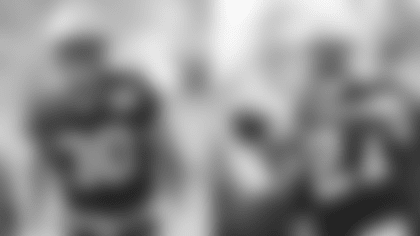What was your best sport growing up? For some people it might not have been football.
"For me, football was not my best sport. I wanted to be a basketball player. I played pee-wee, junior high and high school basketball. The problem was I stopped growing at 6-2 or 6-3, but in my mind I was Charles Barkley. That's what I was growing up. I played Little League baseball but for the most part, I was a basketball player. I was the enforcer. I didn't have problems taking guys out at my size, but once I stopped growing (things changed). My junior year in high school was when I started playing football. The high school coach at the time kept bothering me to play football. I gave it a shot and here I am today. I played two years of football and got a scholarship to Michigan, and the rest is history."
*Where did you grow up and what was the school? When did you first dunk? *
I grew up in Columbia, South Carolina and went to Lower Richland High School, the same school as Richard Seymour and Stanley Roberts, who played in the NBA. Those are the two names people might recognize. I was basketball-crazy. I loved it. I played AAU basketball. I was a basketball freak, and that was all I knew. I just didn't get tall enough. I started expanding instead of rising. I was a good scorer. I played in a Christian church league and averaged 15-20 points per game. That was my junior year when I didn't play at school. I dunked for the first time in eighth grade. We were waiting on a bus to take us to a game and we were goofing around in the gym. I took a ball and dunked it, so at that point everybody had to recognize my game (laughs). It was a watershed moment. I won some money on it. A buddy of mine who was taller than me, dunking was easier for him. As big and round as I was, not very tall, for them to see me dunk it showed what kind of athlete I was. I could dunk until I messed up my knee in college."
What made you try out for football?
"My high school coach, Bill Kimrey, was just a pest. He was always in my ear. You know how high school coaches are. They walk around the building, walk around the schoolyard looking at big bodies. To them, they see football players. Eventually he got me out there my junior year, and I just fell in love with it. He had to ask me a few times, 'Hey, you're too short to play basketball, you're a football player.' That's what I did. I was put at guard. We had an offensive system where we like to pull the guards on sweeps left and right. I can still remember the 28 and 29 sweeps. It was pretty much our whole offense. There were not a lot of passes. We had a Wing-T offense, so there was a lot of pulling involved. We threw like five times a game, so we were a big-time running team. Actually in my junior year, I think we had the biggest offensive line in the state of South Carolina. We averaged more than 300 pounds per lineman. We were good and my athleticism helped me on the line. My junior year we went to the playoffs. My senior year we made the state championship. We were up by 13 with four minutes to go in the game, and we lost. I have a championship on every level of football, except high school. That stunk. Going back and thinking about it, that was probably the most fun I ever had – playing high school football. The bus rides (were good). You rode on the big, yellow bus. The cheerleaders and the band were in tow behind you. You can't beat those days in high school. I am glad Coach Kimrey kept after me."
Is there a different affinity for high school than there is for college or the NFL?
"I think there is. You're young and learning. The experiences you went through had an impact, especially for me. It was all new for me. I didn't play junior varsity. Sometimes schools have the B-team or freshman team. I didn't do any of that because of basketball. Just for me being a junior and having never played and to make the varsity and to start, it was exciting. Just the process of going through recruiting and seeing what it did for me. It offered me a chance to go to school (at Michigan) for free. Michigan was probably one of the most expensive schools in the country. I think out-of-state tuition was about $24,000 a year. It paid the way for me to go."
Was there ever a person who tried to talk you out of playing football?
"No, not at all. My mom, Joyce, didn't care that I played. My brother, Jonathan, ended up doing the same thing I did. He wanted to be a baseball player. Eventually, he became a football player. Now, he's been in the NFL for 11 years (New York Jets, New Orleans, San Francisco). We both did not gravitate right away to football."
What is it like for her having two sons achieve what they have achieved?
"For her now with two sons in the NFL, it's like, 'Who's buying the plane tickets?' I've been in three Super Bowls (one with Chicago; two with Pittsburgh), so I've bought three tickets and a hotel room for her. My brother has only had to do that once (with New Orleans). She picks the places she wants to go. We try to get the tickets in advance so it is cheaper for us. Every now and then, she will call with a last-minute ticket request. For her, it's exciting. It's not often you find a mom with two sons in the NFL, especially with one coaching and one playing. I don't think there is any other duo in the league like that right now. That's pretty special."
Talk about yourself as a player. How would you characterize yourself?
"I never reached my full potential because I got hurt in college. I was athletic. I thought I was powerful. I thought I was pretty good. Of course, I'm not going to say I (stunk). Right about the time I would have started playing at Michigan is when I got hurt. That's when I got into coaching. I thought I was athletic as a guard. I could pull. I could protect, and I thought I was a smart player. For a young guy pretty much learning the game, I though I learned well from older players. I started learning the tricks of the trade. I was coachable because I was still learning the ins-and-outs of the game."
Why did you choose the college you chose?
"It was November or December of 1991, and I think it was a New Year's bowl game. Michigan played Ole Miss in the Gator Bowl. The offensive line was MVP of the game, and you never hear of that. The whole line was the MVP, and usually it is a 'skill' guy or a defensive back. That piqued my interest, and it also was era of the Fab Five, Chris Webber and those guys. That was also big, that March Madness with them playing. That drew my attention to Michigan. I never really thought of Michigan until then. Coming out of high school, I only took two visits. I went to Clemson and Michigan. I just loved Michigan. I tried to hold off because my head coach wanted me to hold off and come back. In South Carolina, they played the All-Star Game in December, and it is the big recruiting season. I did not have a chance to take a whole lot of visits until January. Gary Moeller, who was the Michigan head coach at the time, came to my house. Before him that day, it was Johnny Majors, who was at Tennessee. They tried the squeeze play on me, 'We're running out of scholarships. You'd better come. You have to let us know right away.' When they left the house that afternoon, I called them back that night and I told them I had committed to Michigan. If it weren't the offensive line winning the bowl MVP, it was the Fab Five. I loved the campus when I got there, even though it was as cold as you could imagine."
What about the helmets, were they cool?
"The helmets were cool. The biggest thing they sell you on is the academics first, then the tradition – the number one winning program in college football history, the number of All-Americans, the number of championships. When I got there as a freshman, they had won four Big Ten championships in a row. We won my first year, so that was five in a row. All the guys you looked around and saw, all the guys you played with, all the guys who didn't go on an play pro ball and what they were doing professionally in their careers, you can't beat it – doctors, lawyers, teachers, financial guys. You have friends for life. If you ever need something, just call somebody."
Does every player there leave knowing the words to the fight song?
"Yes, that is something you have to. Even as a rookie in this league (NFL) or a freshman in college, you have to sing. You're taught the fight song early. What they did at Michigan was the band director would come in because we started camp with just the freshmen for a couple of days before the whole team arrived. One of the first things we did was learn the 'Victor's song. Everybody was taught it. If someone woke me up a two o'clock in the morning to this day, I could sing it."
When did you first think about a career in football after your playing days?
"January of 1995, I had a procedure done on my knee because my knee cap was wearing away. I had a choice, I could keep playing and eventually have something done on my knee so I could walk straight. I loved football, but it was not a big enough deal to me to handicap myself later in life. I went on a medical leave. At that time and maybe still now, when you're on scholarship you have to do something to maintain it if you are not physically playing that sport anymore. I could have worked in an academic center or in the athletic department, but I chose to help the coaches. I would go to their morning meetings before class. I went to class then came back for practice, then I went home at night to study. That is when I got into coaching and fell in love with it. I did the summer internships and hated working normal jobs. Coaching keeps you active to where you teach but also work on your people skills when you meet them every day."
What is your favorite quote on football, leadership, etc. that has shaped your career the most? Explain how/why/when you found it and how you have applied it.
"One of the ones I have is simple and goes more toward the players, and Mike Tomlin (of the Steelers) said it all the time, 'The more you can do.' In this profession, you have to be flexible. Last year in Pittsburgh, Kirby Wilson, our running back coach, was in a house fire just before a playoff game. I've been coaching the O-line pretty much my whole career and I coached the running backs that game (in Denver). 'The more you can do.' You have to be flexible. That was an instance it came true for me. There are other things I'll talk about, like 'The Dash.' 'The Dash' talks about on every headstone there is a dash, and it starts with the year you are born and ends with the year you die. As a man, 'What did you do between those dates?' That's 'The Dash,' – what is your legacy, what did you leave behind? That's something else I stress. When I leave this earth, what will Chuck Pagano say about me? What would my high school teacher say about me? That's how I live my life – 'The Dash.' "














